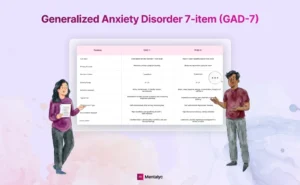Are you a mental health practitioner who sometimes struggles to diagnose depression in your clients accurately? No worries, we've got just the thing for you – the Patient Health Questionnaire 9 (PHQ-9)! This fantastic tool enables your clients to express their emotions and feelings related to depression. The best part? It's super user-friendly and easy to fill out, and you can quickly score and interpret the responses to understand the severity of their depression.
The PHQ-9 is a game-changer because you can use the results to develop personalized treatment recommendations for your clients. Plus, with regular follow-up PHQ-9s, you can monitor their progress and adjust their treatment plans accordingly. You'll be providing your clients with the highest quality of care they deserve, and that's what it's all about, right? So why not give the PHQ-9 a try today and see the tremendous difference it can make in your practice? We promise you won't regret it!
What is the PHQ-9 Questionnaire?
The PHQ-9 is a widely used screening tool that plays a crucial role in diagnosing depression and monitoring clients' progress. It provides mental health professionals with an objective and standardized way to measure symptoms and track progress, helping them to assess the severity of depression accurately and develop an effective treatment plan. The questionnaire assesses the level of depression in their clients, giving mental health experts valuable insights into their condition. By administering the PHQ-9, healthcare professionals can determine whether their clients meet the criteria for depression or suicidal thoughts and create a personalized treatment plan based on their results.
Questions on the PHQ-9 Questionnaire
The PHQ-9 questionnaire consists of nine questions that assess the severity of a client's depression. The questions are straightforward for clients to understand. They focus on how often, over the past two weeks, a client has experienced specific symptoms related to depression, including:
1. Lack of interest or joy in activities 2. Experiencing sadness, depression, or hopelessness 3. Difficulty in falling asleep, staying asleep, or excessive sleep 4. Persistent fatigue or low energy levels 5. Changes in appetite, either a reduced or increased intake 6. Negative self-perception, feeling like a failure or letting oneself or family down 7. Challenges concentrating on tasks like reading or watching TV 8. Observable slowness or restlessness by others 9. Thoughts of being better off dead or self-harm
Each question asks the respondent to rate how bothered they have been by the depression symptoms over the last two weeks on a scale ranging from 0 (not at all) to 3 (nearly every day).
When to Administer the PHQ-9
Clients can complete the PHQ-9 before appointments or during therapy sessions, providing therapists valuable insight into their symptoms. It is a quick and easy assessment that takes only a few minutes to complete, making it an ideal option for clients and therapists.
As a practitioner, you should administer the PHQ-9:
- At the initial visit, to screen for depression.
- Regularly monitor changes in their condition and the effectiveness of any treatment and make changes as needed
- Whenever you suspect their depression may have worsened or improved.
Usually, administering the PHQ-9 every four to six weeks is adequate for most clients. However, for those suffering from severe depression or who have recently started or changed treatment, it may be necessary to use it more frequently, such as every two to four weeks, ensuring that clients receive the appropriate care and treatment level.
Why Use the PHQ-9?
The PHQ-9 questionnaire is a valuable tool for practitioners to diagnose depression, determine the severity of symptoms, and make informed treatment decisions. It provides an objective measure of a client's symptoms, which can be tracked over time, enabling practitioners to monitor whether symptoms improve or worsen with treatment. This complements the information obtained from interviews and observations, giving practitioners a more comprehensive view of the client's depressive state. The PHQ-9 score, along with clinical assessment, helps practitioners develop individualized treatment plans and manage medication effectively.
Administering the PHQ-9 provides several benefits:
- It's short, accessible, and easy to score.
- It assesses the nine signs of depression from the DSM-5.
- It generates a severity score to help determine diagnosis and appropriate treatment.
- It allows you to track symptom changes to evaluate treatment progress.
- It facilitates discussions about depression symptoms and severity.
The results of the PHQ-9 questionnaire and your clinical assessment can assist in determining the most suitable treatment for your clients. However, it is essential to note that while the PHQ-9 is a helpful tool, it should not be used as a substitute for a comprehensive clinical evaluation; instead, use your clinical judgment in conjunction with the PHQ-9 scores to assess your clients' diagnoses and determine the appropriate treatment.
Interpreting PHQ-9 Scores and Proposed Treatment Actions
Once you've administered the PHQ-9, it's time to score it and determine appropriate treatment recommendations.
Scoring the PHQ-9
Scoring the PPHQ-9 is a simple process. To score each of the nine questions, use a scale of 0 to 3, where zero means that the symptom is not present and three points that the symptom is present almost daily. Add the scores for each question to get a total score, each representing a different level of depression severity.
Interpreting the Score
- 0-4: Minimal depression
- 5-9: Mild depression.
- 10-14: Moderate depression.
- 15-19: Moderately severe depression.
- 20-27: Severe depression.
Treatment Recommendations
It is necessary to consider that the severity of depression increases as the score on the PHQ-9 questionnaire gets higher. Based on the score obtained from the PHQ-9, the practitioner can suggest appropriate treatment options:
- For scores of 0-4: Watchful waiting and repeat PHQ-9 at a later date.
- For scores of 5-14: Offer your client psycho-education and discuss treatment options like therapy or medication.
- For scores of 15-19: Provide your client with psycho-education, counseling, or therapy, and consider the possibility of medication.
- For scores of 20 or higher, Clients should likely undergo active treatment with a combination of therapy and medications. It is highly advisable to seek a referral to a psychiatrist for further evaluation and management.
When assessing depression levels, it's essential to consider other factors such as substance abuse, history of trauma, suicide risk, and level of functioning. It is crucial to conduct follow-up questionnaires to monitor the treatment progress.
The Benefits and Limitations of the PHQ-9
Although the PHQ-9 can provide valuable information for delivering quality care, it should not be solely relied upon in diagnosing or devising a treatment plan for a client. It is crucial to acknowledge the limitations of the PHQ-9 and utilize it with a thorough assessment conducted by a mental health expert.
Administering the PHQ-9 provides several benefits:
Benefits
- The PHQ-9 is a free, quick, and evidence-based tool for diagnosing and grading depression severity.
- The PHQ-9's brevity makes it ideal for initial screening and monitoring treatment progress, allowing clinicians to systematically track a client's depressive symptoms over time and in response to treatment.
- Standardized scoring enables clinicians to measure symptom improvement reliably and make evidence-based treatment recommendations based on depression severity.
- It provides a quick baseline assessment that can inform discussion and further questioning to gain a fuller clinical picture of the client.
Limitations
- The PHQ-9 questionnaire relies on clients' self-reporting, which can be influenced by their recall, interpretation, and willingness to disclose sensitive information, leading to varying levels of accuracy and subjective insight.
- It does not provide a definitive diagnosis of depression or determine specific causes of symptoms.
- The PHQ-9 primarily focuses on the nine DSM criteria for major depression, potentially missing other psychiatric comorbidities, such as anxiety or bipolar disorder.
- Cultural differences and language barriers may affect a client's interpretation and responses.
- The PHQ-9 only asks about symptoms within the last two weeks, so that it may miss chronic or intermittent depression.
- PHQ-9 scores are sensitive to changes in life circumstances and stress levels, not just depression.
- The questions are worded generally and may not accurately capture certain depressive symptoms in specific populations.
Before and After Administering the PHQ-9: Factors to Consider
- The PHQ-9 is a self-administered questionnaire. Therefore, checking for consistency between the scores and clinical observations is paramount.
- Before diagnosing depression, it's essential to rule out any potential medical causes of symptoms that may affect mood and mental health.
- Before diagnosing depression, consider the context and look for a pattern of high scores over multiple assessments, as life events may temporarily elevate scores.
- Please note that the PHQ-9 only provides a score indicating the severity of the symptoms and not a conclusive diagnosis. We highly recommend having a conversation with the client to gain a better understanding of their symptoms and experiences.
- The PHQ-9 should not be the only measure of progress; improvement should also be assessed based on symptoms, functioning, and quality of life changes.
- Discuss the results with the client and consider their input in the diagnostic and treatment process. A collaborative approach will lead to the best outcomes.
Conclusion
As a healthcare professional, you understand the challenges of identifying depression in your clients. But you also know you can make a significant difference in their lives with the right tools and clinical expertise. By incorporating the PHQ-9 assessment into your client care, you can gain valuable insights and provide the best treatment for their needs. Staying up-to-date with the latest guidelines and prioritizing your clients' well-being is crucial. Your compassion and dedication to helping them overcome depression can profoundly impact their lives. So, keep up the great work, and continue improving lives!
Tired of spending hours typing up progress notes? Look no further than Mentalyc. Our app uses AI technology to transcribe recordings into hassle-free progress notes in minutes. With our free trial, you can see how easy progress notes can be. So why wait? Try Mentalyc today and experience the convenience of automated progress note-taking.
FAQs About the PHQ-9
Here are answers to some of the most frequently asked questions regarding the PHQ-9:
How often should the PHQ-9 be administered?
It is recommended to administer the PHQ-9 questionnaire during the initial visit and repeat it during follow-up visits to track the progress and outcomes of the treatment. For individuals with mild to moderate depression, it is recommended to administer the PHQ-9 every four to six weeks. In comparison, those with severe depression may require administration every two to four weeks.
What are the benefits of the PHQ-9?
The PHQ-9 is a free and quick assessment tool with a severity score to guide treatment. It is also sensitive to changes over time, making it helpful in monitoring symptom improvement or worsening.
What are the limitations of the PHQ-9?
The PHQ-9 screening tool aids diagnosis but should not be used as a standalone diagnostic instrument. It relies on client self-report and may miss some symptoms, which cultural factors can influence.
How are PHQ-9 scores interpreted?
Scores 5, 10, 15, and 20 indicate mild, moderate, moderately severe, and severe depression, respectively. A score of 10 or higher suggests treatment. Scores of 15 or higher require antidepressant medication and psychotherapy.
References:
- Heerema, E. (2021, February 14). All About the PHQ-9: Patient Healthcare Questionnaire for Depression. Verywell Mind. https://www.verywellmind.com/phq-9-patient-healthcare-questionnaire-for-depression-4149685
- PHQ-9 | Depression. (2023, May 9). Greenspace. https://greenspacehealth.com/en-us/phq-9/
- Vu, L. G., Le, L. K., Dam, A. V. T., Nguyen, S. H., Vu, T. T. M., Trinh, T. T. H., Do, A. L., Do, N. M., Le, T. H., Latkin, C., Ho, R. C. M., & Ho, C. S. H. (2022). Factor Structures of Patient Health Questionnaire-9 Instruments in Exploring Depressive Symptoms of Suburban Population. Frontiers in Psychiatry, 13. https://doi.org/10.3389/fpsyt.2022.838747
- Wilson, H. (2022, August 29). What Does the PHQ9 Measure? Proem Behavioral Health. https://blog.proemhealth.com/patient-health-questionnaires
Why other mental health professionals love Mentalyc

“I benefit tremendously every time I wrap up a session and then a few minutes later, I have this AI note. It makes me a better clinician in a variety of ways.”
LPC

“It helps align the note and the plan for moving forward with sessions … it’s been a really good aid in giving me direction.”
LPC

“It improves the quality of my work as I review my sessions … I bring a sense of continuity from session to session because of the really good summary and progress notes that Mentalyc gives me.”
Licensed Marriage and Family Therapist

“I go back and can read the notes, and it really helps me for the next session. It has made me a much better counselor.”
Licensed Professional Counselor





